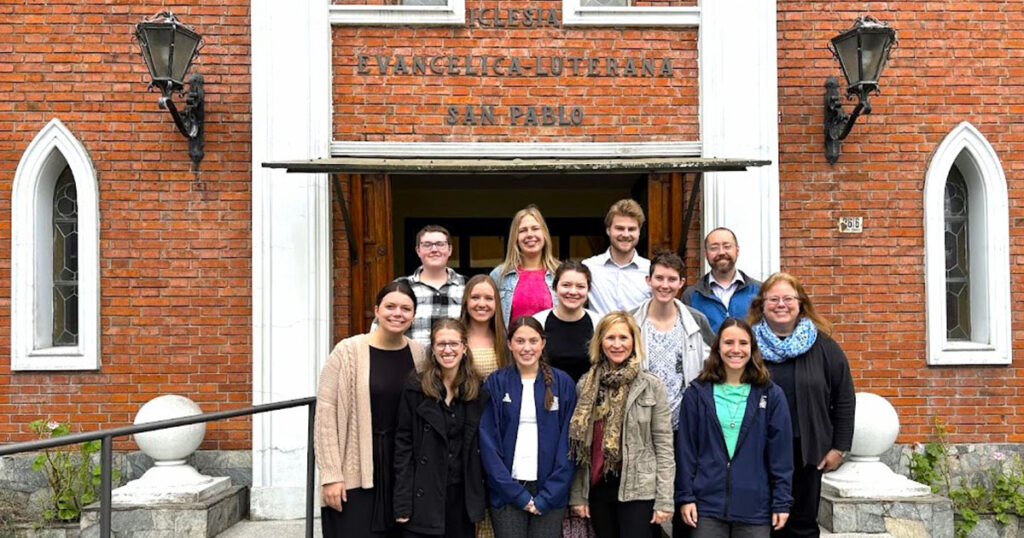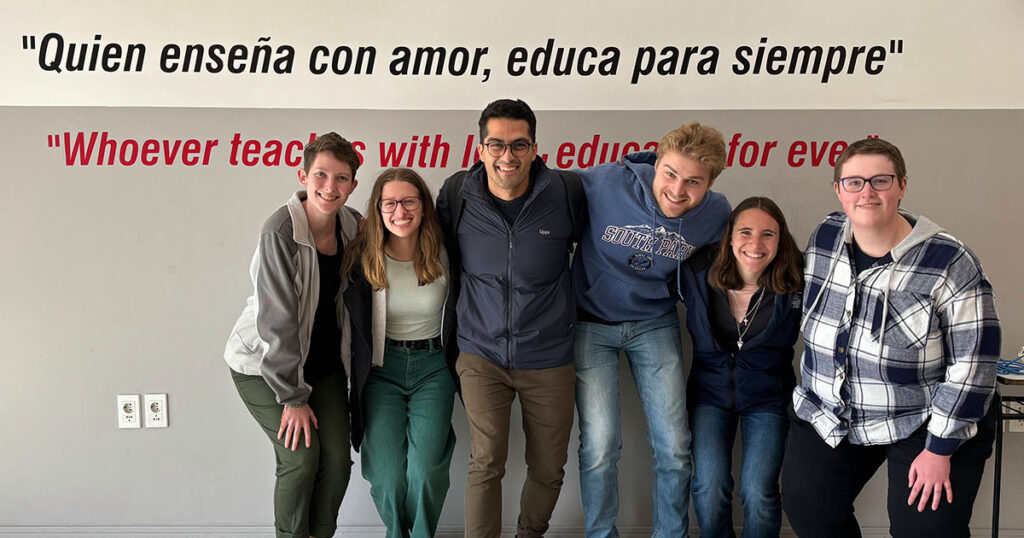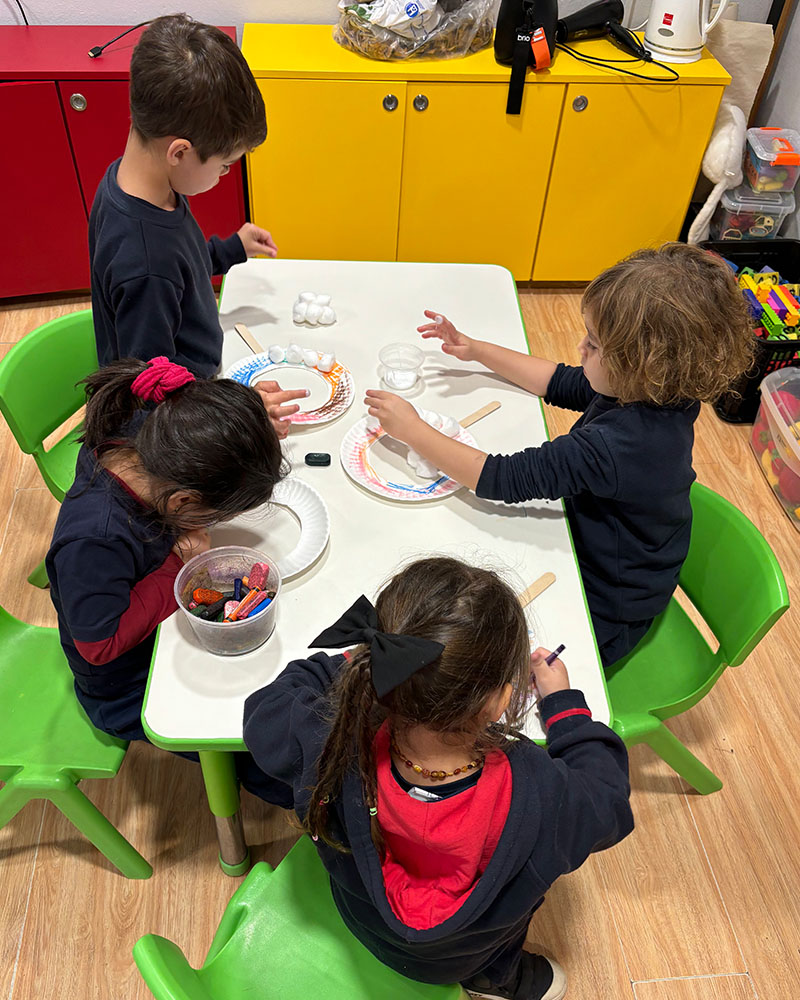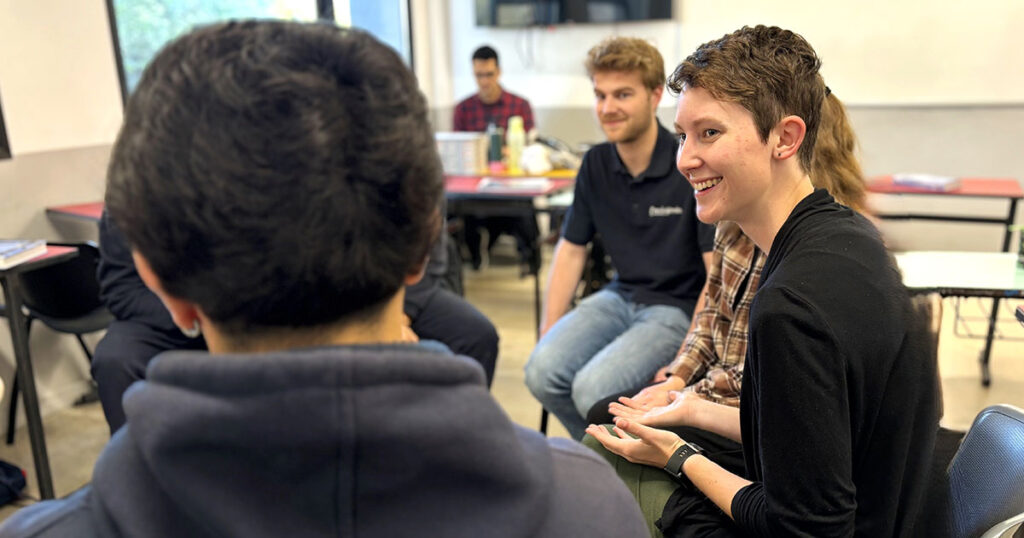
A team of students from Concordia University, Nebraska, served at St. Paul Evangelical Lutheran Church and School in Montevideo, Uruguay, during a May 7–15, 2024, mission trip coordinated by LCMS International Mission. (Photo by LCMS missionary Erin Mackenzie.)
A group of students from Concordia University, Nebraska, Seward, Neb., served on a short-term mission trip May 7-15, 2024, at Iglesia Evangelica Luterana San Pablo (St. Paul Evangelical Lutheran Church) in Montevideo, Uruguay. Lauren Dawson shares the following reflections on her team’s experience and impact during the trip, which was coordinated by LCMS International Mission.
By Lauren Dawson, LCMS short-term mission team member
It’s not every day that a group of students from small-town Nebraska gets to travel to Montevideo, the capital of Uruguay.
It’s not every day that they get to teach about God in a school where most students aren’t Christian and speak much more Spanish than English.
It’s not every day that they get to watch a foreign church in action and learn from a group of pastors and teachers so very passionate about showing God’s love to those around them.
It’s not every day. It’s probably more like once in a lifetime. But as my team learned in Uruguay, lifetimes can be changed even by something that happens just once.

The middle school and high school teaching groups from Concordia, Nebraska, pose with their partner teacher in front of the St. Paul school motto: “Whoever teaches with love educates for forever.” (Photo by LCMS missionary Erin Mackenzie.)
Day by day
Our task during our one-week stay in Montevideo was to work with Iglesia Evangelica Luterana San Pablo (St. Paul Evangelical Lutheran Church) to aid in their mission: sharing the Gospel, primarily with the students in their school — a K–12 setting where most students are not Christian, let alone Lutheran.
We aided by stepping into the classroom and teaching Bible lessons to students in Grades K–11 in the mornings. Our large group split into smaller teaching groups, one elementary and one secondary, and each group got to work with a partner teacher throughout the week.
The secondary group taught lessons about the apostle Stephen and the hope he had in Christ even in the face of persecution.
The elementary group taught about the Good Shepherd and did a related craft. (I will never look at a paper plate the same way again, and I’ve never heard so much “baa”-ing in my life!)

St. Paul elementary students build their crafts — sheep masks with ears that say, “Who loves you?” “Jesus loves you!” (Photo by LCMS missionary Erin Mackenzie.)
Between classes, we helped prepare crafts, tweaked our next lesson plan, or walked to another campus since the school was split up across three different buildings separated by a few city blocks.
After the morning classes, we all got together for lunch, which was always an adventure. One of my favorite parts of being in Uruguay was all the learning I was able to do. I loved learning more Spanish, learning new customs, and, during lunch time, learning about Uruguayan food! (It’s amazing, by the way.)
In the afternoons, we hopped right back in with some more teaching.
During the school day, we invited students to other church activities, and we helped lead those activities after the school day ended.
One evening, we got to teach the Good Shepherd lesson at an after-school get-together for Cristo para todas las naciones (the Spanish name for Lutheran Hour Ministries). Another night, we shared our stories of faith with Jusanpa, San Pablo’s youth group, and on our last night in Montevideo we got to attend a church service and dinner with the confirmation class.
These were great ways to connect with students, with congregation members, and also with the pastors and teachers of San Pablo. They were amazing people.
I learned a lot from teaching all week, but I learned even more from seeing the way these people cared so intentionally for their students. They talked about Christ in the classroom, preached about Him at events all week long, made sure to form strong relationships with students, invited them to church events constantly, and asked us to do even more of the same.
So that was our day-to-day: teaching, lunch, teaching, then outreach programs. That’s what we did. Let’s talk for a minute about what it accomplished.

Lauren Dawson, a student from Concordia, Nebraska, shares her testimony of faith with high school students in Montevideo, Uruguay, during an LCMS International Mission short-term trip. (Photo by LCMS missionary Erin Mackenzie)
The impact
Like I said at the beginning, a once-in-a-lifetime event can make a huge difference in someone’s life, and there were a few different “someones” being impacted in Montevideo.
The first group of “someones” was my team.
The culture in Uruguay is, of course, different from U.S. culture, and my team learned a lot in that regard. The people of Uruguay really value relationships, and that’s shown in some of their customs.
My team learned to greet people by kissing them on the cheek, and I think I gave more hugs that week than in the last year! The students were very excited to connect with “the Americans,” and it seemed that wherever we were in the school, kids were pointing at us and waving with the biggest smiles on their faces.
These things impacted my team. It made us learn quickly, adapt to a culture with expectations different from our own, and, most importantly, commit to our faith. We talked about Christ a lot that week — much more than we do in the United States — and in much simpler language, since the students were still learning English.
We got to say, “Yes, I am a Christian. I believe in a God who loves me, and He loves you too,” to a room full of kids who didn’t see eye-to-eye with us. By speaking about our faith in the most basic terms, we got a lot of practice being “[un]ashamed of the Gospel” (Rom. 1:16).
More importantly, the second group of “someones” was the students at San Pablo. I have two favorite memories of this.
The first happened after the secondary teaching group finished helping during a Bible class taught by the San Pablo teacher. We were all walking out after the lesson when he turned to us and said, “Wow. I have never seen the students so engaged.” It was crazy that something so small as a group of Americans sitting with them had led the students to dive deeper into the Scriptures and to pay more attention to what the teacher was saying about God.
The other memory that sticks out to me was when my group got to share our stories of faith with some of the high school students during their Bible classes. Again, most of the students weren’t Christian, so we wanted to show them that people their age could be Christian, and what were some reasons for our faith. And I can’t really describe it, but there was a certain look in the students’ eyes that stuck out to me, a certain way they moved and made eye contact and didn’t fidget that told me exactly when they stopped hearing and started listening.
It was amazing to see these students, who didn’t really know us, had no reason to care, and were listening to stories of someone else’s faith in their second language, really listening to what we were saying. They got it. They understood, and they asked amazing questions afterward about faith, and the world, and why we believe what we believe. Some of our students even attended Jusanpa (the youth group) or came to the confirmation service that week, even though they normally didn’t.
Clearly, the Lord is at work in Uruguay. He’s doing amazing things through San Pablo church and school, and my team was blessed to be a part of it during our week in Montevideo.

Chivito, the national dish of Uruguay, was the favorite meal of most of the short-term team. (Photo by Amy Stradtmann.)
In summary
It’s not every day that a group of college kids from Nebraska gets to go to Montevideo.
It’s not every day that a class full of Uruguayan high schoolers gets to hear about Christ from a group of English-speaking Americans not much older than they are.
It’s not every day that people really listen to each other, and connect, and, when they meet again, greet each other with a kiss on the cheek.
It’s not every day.
But it is every day that all these people get to see God at work.
Though the cultures in the U.S. and Uruguay are different, and the time zone is different, and the people, the customs, the language, the … everything is different, our God is the same. He’s working through His people here and abroad, and I’m grateful for the opportunity to see His work in Uruguay and excited to see how He continues to work through His people in the U.S. and elsewhere.
Visit lcms.org/servenow to find your opportunity to serve the Lord and His people through LCMS International Mission.